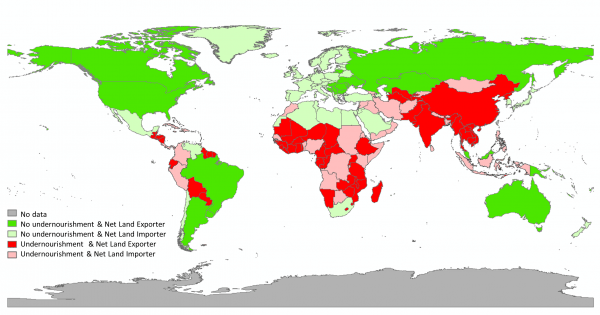UMD Researchers Investigate Link between ‘Land Grabs’ and Undernourishment
Worldwide, more and more countries are strategically investing to extend their natural resource base beyond their borders, frequently into developing countries. New research from the University of Maryland (UMD) finds this global trend could put already-vulnerable populations at higher risk for undernourishment and food insecurity.
The UMD study, recently published in the Journal of Cleaner Production, takes a close look at the increasingly common practice of land displacement—the use of land in one country to grow food and other crops to be consumed in another country. The research team analyzed the amount of agricultural land used for the production of crops traded between 133 countries and regions. Their findings show a link between large-scale land acquisitions (LSLAs)—frequently referred to as “land grabs”— and undernourishment in countries exporting their land-based resources.
“International trade is playing an unprecedented role in the distribution of food between countries around the world and is greatly impacting the global food supply,” said lead author Suzanne Marielle Marselis, a researcher in the UMD Department of Geographical Sciences. “In the case of land displacement, even if local food production may increase, it is often not available to the local population. Therefore, food insecurity and undernourishment are not a result of a lack of food, but a maldistribution of available food.”
The study authors note that undernourishment and food security are complex problems influenced by many factors other than land displacement including natural disasters, conflict, governance and fluctuations in demand and commodity prices. Proponents of agricultural land acquisitions argue that the practice leads to higher crop yields, technological innovation and job opportunities for local populations. Others argue the benefits are overshadowed by negative impacts such as depletion of natural resources, environmental degradation, loss of land available to smaller farmers and misappropriation of funds and food. Countries like Ethiopia, Malawi, Sudan, Madagascar, Cambodia and Kenya are currently center stage in the debate over the relationship between land grabs and food insecurity.
“We hope our findings can contribute to and move the debate forward and that further research will consider the impact of land displacement on poverty and undernourishment,” said study co-author Klaus Hubacek, a UMD Geographical Sciences Professor. “Stronger restrictions may be necessary to control LSLAs and mitigate the potential negative consequences.”
In addition to Marselis and Hubacek, the research team included: Kuishang Feng and Jose Daniel Teodoro, also with the UMD Department of Geographical Sciences; and Yu Liu from the Institute of Policy and Management at the Chinese Academy of Sciences.*
*this article is a copy of the original source :https://bsos.umd.edu/
Published on Tue, 06/13/2017 - 14:12


